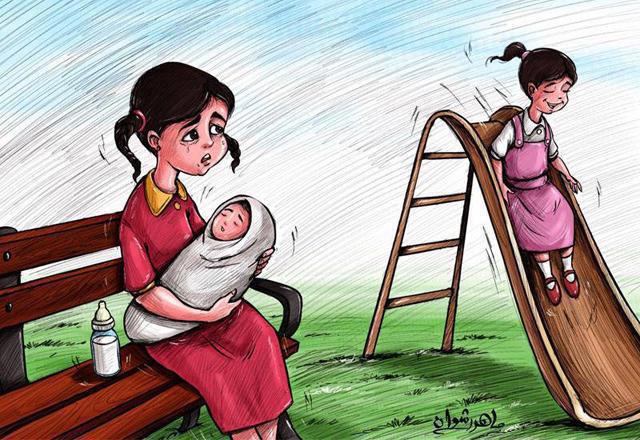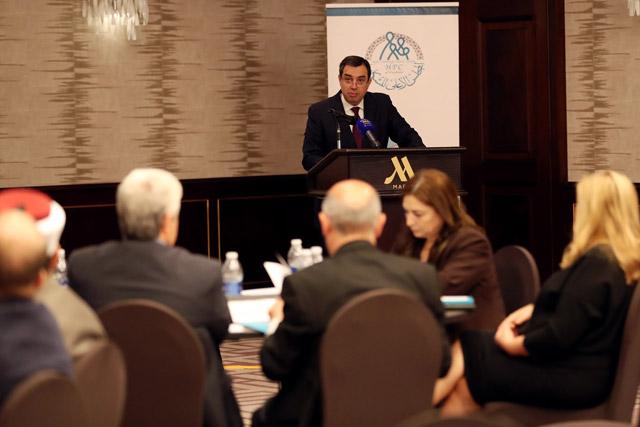You are here
New early marriage regulations draw fire from civil society
By Rana Husseini - Jul 18,2017 - Last updated at Jul 18,2017
AMMAN — New regulations issued by the Cabinet on Sunday to regulate the legal age for early marriage for girls drew criticism by activists and women groups in Jordan, with many describing it as a “step backwards”.
The regulations replace a previous legislation issued in 2011 that specified the age of marriage for boys and girls along with other matters related to the marriage of youngsters. In 2002, several changes were made to the Personal Status Law including raising the legal age of marriage for men and women to 18 from 15 for women and 16 for men, but the changes still allowed exceptions.
The new regulations addressed the exceptions of allowing the marriage between the age of 15 and 18. They included provisions that allow a maximum 15-year, and less, age difference between the husband and the wife, provided that the would-be husband is not married and that marriage would not prevent the girl from pursuing her education.
Under the suggested law, the judge will have the authority to decide if tying the knot to girls between 15 and 18 would be in their best interest and permit the registration of the marriage contract.
The court is also entitled to explain to the girl that she has the right “to place conditions that will be to her benefit”.
The regulations also stipulated that the newlyweds should present a certificate that they both attended a workshop on marriage beforehand, organised by the Iftaa Department.
Former minister and activist Asma Khader said the new regulations “tighten up the exceptions but there are many loopholes in them including clear criteria”.
“The new regulations do not specify how a judge can check the criteria for such marriage such as if the groom is qualified and the girl really fit to be married,” Khader argued.
Khader added that the regulations do not specify what kind of punishments are available “in the event a judge does not abide by the law”.
She added that one important article was scrapped from the new regulations that stipulated the approval of the chief Islamic justice.
“With such an article missing, it will be extremely hard to ensure the monitoring of such marriages and any violations that might occur,” Khader explained.
That is why “we need to have regulations that are clear and will ensure a minimal percentage of such marriages”, Khader maintained.
“In many countries of the world, the percentage of early marriage is between 1 and 2 per cent. In Jordan, it is around 13 per cent and this is a very high percentage,” according to Khader.
Secretary General of the Jordanian National Commission for Women (JNCW) Salma Nims emphasised that the regulations stipulating the exceptions were not new.
“The JNCW position is that all forms of exceptions [the 18-year-minimum age requirement] should be removed, but, if the exceptions are to remain, then it should be raised to 16,” Nims told The Jordan Times.
The regulations should ensure “limitations in cases of child marriage and only apply to clear cases that could affect the lives of the individuals if they do not wed”, Nims added.
According to Nims, the JNCW has previously proposed to form a special committee comprised of experts to study each case individually and make a decision, so that the marriage “does not only depend on the sole discretion of a judge”.
Nims also said that there was “some ambiguity in some of the clauses, such as the part that talks about education.”
“What level of education are we talking about here? High school? University? It is not clear. There is no article, either, that stipulates what would happen if the marriage ended in the termination of the girl’s education,” Nims noted.
According to a December report by the Sisterhood Is Global Institute (SIGI), nearly 20 per cent of marriages registered in Jordanian courts in 2015 involved brides aged between 15 and 18.
Citing the Department of Statistics, SIGI said 16,019 under-age women were married in 2015, amounting to 19.7 per cent of the 81,373 marriages recorded in the Kingdom.
Activist and feminist Zuleikha Abu Risheh expressed her disapproval of the new regulations. “We are banging our heads on the wall with this useless government and the regulations it issues,” she told The Jordan Times.
Although the law added more restrictions, Abu Risheh argued that “the changes are not significant enough, as long as they still allow children to get married to begin with.”
“Many studies have shown that girls marrying at a young age will be subjected to all forms of physical, psychological and emotional harm. Individuals should be full grown-ups to be responsible enough to carry out their marriage duties,” Abu Risheh told The Jordan Times.
Noor Shbeitah echoed Abu Risheh’s concern on her Facebook page: “In Jordan, no one who is 16 can drive a vehicle because he/she is not mature enough to control an iron device, but, according to the law, they are allowed to get married, especially girls.”
Tayseer Abu Odeh also took to Facebook to criticise the decision heavily, describing it at “dangerous” and “a step backwards”.
The decision is a clear social and cultural danger, wrote Abu Odeh.
“Individuals of this age usually dream of playing on a swing or with dolls, not to be thrown into hell and destruction… we are walking backwards,” Abu Odeh wrote.
But Abbas Ali had an opposing opinion saying that “it was part of the Islamic Sharia that allows marrying girls once they have reached puberty.”
“This is what our Creator decided. Once the girl reaches puberty, then she is ready to have children and this is natural,” Ali argued.
According to the Higher Population Council, some 13.5 per cent of married women in Jordan were wed before the age of 18, and a majority was educated to the primary level or lower. The report also showed that one in four women who married early was illiterate.
A more recent report by Save the Children entitled the “Stolen Childhoods” released in June of this year showed that one in every four children around the world is being denied a childhood. Assessing where childhood is most and least threatened, the report ranked Jordan 51st out of 172 countries globally, and 8th out of 14 in the Middle Eastern and North African region.
The global index included criteria such as extreme violence and conflict; early marriage and pregnancy, child labour, poor health and inability to attend school.
Related Articles
AMMAN — The NGO CARE International on Monday announced the opening of a competition for a $20,000 grant to local organisations focusing on a
AMMAN — Women groups on Saturday welcomed a recent decision by the National Council for Family Affairs (NCFA) to reconstitute the national c
AMMAN — Planning and International Cooperation Minister Imad Fakhoury on Sunday condemned child marriage as “a reproduction of poverty, igno


















